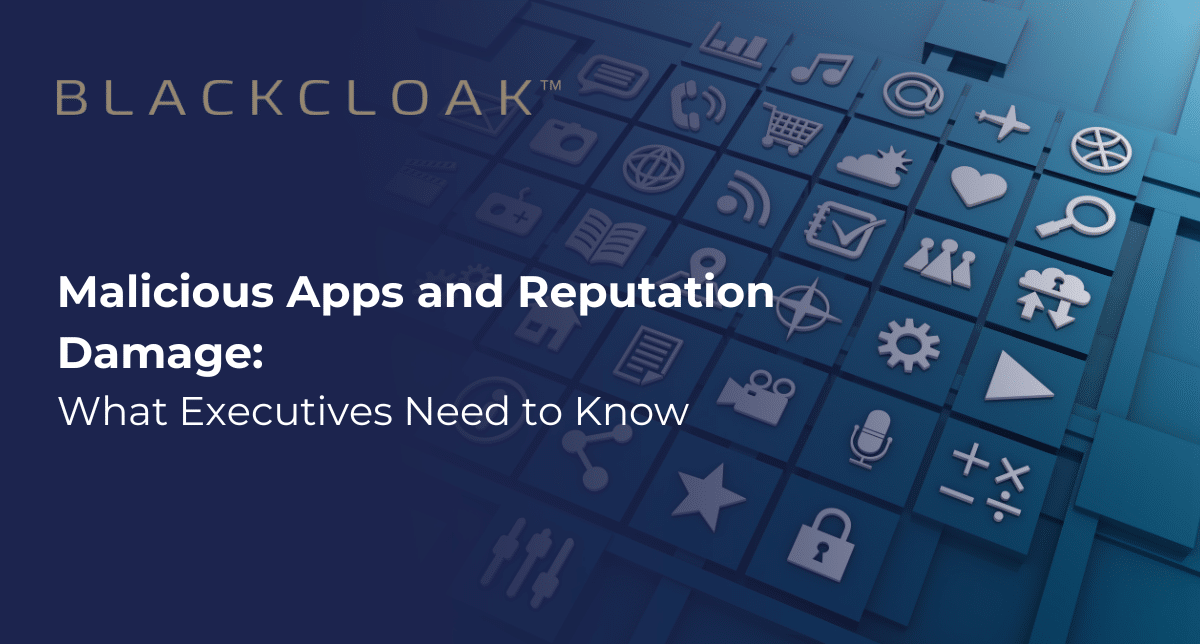Malicious Apps and Reputation Damage: What Executives Need to Know

The threat landscape today has expanded beyond traditional physical boundaries. One of the most significant threats comes from malicious apps, which can cause severe damage to an organization’s reputation.
What are Malicious Apps?
Malicious apps are software programs designed to harm or exploit users’ devices or personal information. They often disguise themselves as legitimate applications, and once installed, they can perform various harmful actions, such as stealing personal data, displaying unwanted ads, or even taking control of your device.
Malicious apps can also be defined as legitimate apps from real-world companies that, while intending to offer a valid service, poorly safeguard your data, resulting in personal reputation damage, financial impact, and identity theft.
How to Detect Malicious Apps
Source Verification: Only download apps from trusted app stores to minimize the risk of encountering malicious software.
Review Analysis: Examine user reviews and ratings. Frequent complaints or a majority of poor ratings can indicate suspicious activity.
Permission Requests: Be cautious of apps that request more permissions than needed for their intended functionality. Unnecessary access to sensitive data may suggest malicious intent.
Regular Updates: Keep your device and its apps updated. Regular updates often include security patches that protect against newly discovered vulnerabilities.
Personal Security Software: Utilize a reputable security application to scan and protect your device from potential threats.
Real-World Examples of Malicious Apps
Let’s look at some real-world examples that highlight the potential risks associated with apps that are offered by legitimate services. These apps can be labeled as malicious due to their poor data security practices:
- Pegasus Airlines: A system administrator’s cloud misconfiguration led to the exposure of personally identifiable information (PII), potentially compromising the safety of passengers and crew members.
- Dating Apps: Apps such as Tinder, OKCupid, and Bumble have been scrutinized for their insecure data storage practices, which can expose users’ names, login details, message history, and even location.
These incidents underscore how a single security lapse can lead to significant reputational damage.
The Impact on Executives
As leaders, executives are often the face of their company’s brand, responsible for maintaining the trust of customers, investors, and the public. A single cyber incident can lead to significant financial losses, legal repercussions, and most importantly, reputational damage. High-profile cyber incidents such as the SolarWinds incident, the Colonial Pipeline ransomware attack, and the Equifax data breach in 2017 highlight how quickly an organization’s reputation can be affected by cyberattacks.
Protecting Your Reputation
So, how can executives protect their reputations from being ruined by malicious apps? Here are some strategies:
- Prioritize Cybersecurity: In today’s digital world where cyber threats are ever-present, it is essential for executives to prioritize cybersecurity to protect their personal footprint, reputation, and the trust placed in them by stakeholders.
- Proactive Strategies: Reputation management for executives involves proactive strategies to build and maintain a positive public image. Cybersecurity plays a crucial role in this, as it helps prevent incidents that could tarnish an executive’s reputation.
- Clear Communication: By defining clear thresholds, designating communication channels, securing information flow, and sharing swift responses, executives can navigate cyber incidents with resilience and integrity.
BlackCloak Digital Reputation Protection for Executives
The intersection of cybersecurity and reputation management for executives is clear. By prioritizing cybersecurity and integrating it into their reputation management efforts, executives can ensure the longevity and success of their brand in the face of potential cyber challenges.
Looking to learn how BlackCloak can protect executives’ privacy and reputation? Request a free demo today.










